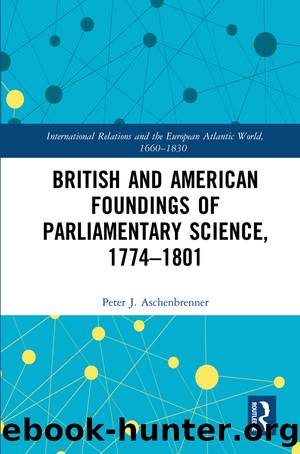British and American Foundings of Parliamentary Science, 1774â1801 by Aschenbrenner Peter J

Author:Aschenbrenner, Peter J.
Language: eng
Format: epub
Publisher: Taylor & Francis (CAM)
Published: 2017-08-14T00:00:00+00:00
Not surprisingly, Jefferson had very mixed emotions on taking up his duties in the Senate; surprisingly, he recorded them for posterity in his Manual. The President of the United States Senate âmust feel, weightily and seriously, this confidence in his discretionâ. On this occasion Jefferson referred to the Presidentâs ânecessity of recurring, for [the Senateâs] government, to some known system of rules, that he may neither leave himself free to indulge caprice or passion, nor open to the imputation of themâ.43
The lack of how-to guidance for the presiding officer placed âunder the discretion of the President a very extensive field of decision, and one which, irregularly exercised, would have a powerful effect on the proceedings and determinations of the Houseâ.44 Jefferson shouldered significant burdens as President of the Senate. Working in a half-completed, half-unfinished environment was not unknown to Jefferson. Renovations at Monticello, after his retirement as Secretary of State, began in 1794. His swearing-in as President took place on 4 March 1801, when the Capitol was still unfinished. Jeffersonâs visit to John Adams took place in another construction site, the Presidentâs Palace. This building became Jeffersonâs official residence after his inauguration. Over the 15-year interval from 1794 to 1809 Jefferson endured the inconveniences of construction-in-progress at Monticello. The University of Virginiaâs principal edifice â another one of his domed structures and one which became known as âThe Rotondaâ â was likewise under construction at the time of his death (4 July 1826). In his appeal to âthose who come after meâ Jefferson described the state of the Senateâs procedural code as unfinished. He introduced his Manual under the motto âI have begun a sketchâ. This experience mirrors the physical environment in which he worked as he put the final touches on the Manual at the close of his term of office (December 1800 â February 1801). On other occasions Jeffersonâs work was subjected to rough handling. Jeffersonâs draft of the Declaration of Independence â an inventory of prescriptions layered on foundations of âhuman eventsâ and fashioned as national grievances â was treated as fodder for extensive wrangling and rewriting-by-committee. His Land Ordinance of 1784 detailed a plan for imposing legal order on geophysical reality in the new territories that Congress acquired and organised. After Congress dispatched Jefferson to Paris as its Minister to France, delegates repealed his ordinance, thereby rubbishing the evocative names he offered for future American states, such as Metropotamia and Sylvania.
Download
This site does not store any files on its server. We only index and link to content provided by other sites. Please contact the content providers to delete copyright contents if any and email us, we'll remove relevant links or contents immediately.
| Africa | Americas |
| Arctic & Antarctica | Asia |
| Australia & Oceania | Europe |
| Middle East | Russia |
| United States | World |
| Ancient Civilizations | Military |
| Historical Study & Educational Resources |
Machine Learning at Scale with H2O by Gregory Keys | David Whiting(4295)
Never by Ken Follett(3937)
Fairy Tale by Stephen King(3370)
Oathbringer (The Stormlight Archive, Book 3) by Brandon Sanderson(3157)
The Man Who Died Twice by Richard Osman(3072)
Will by Will Smith(2911)
Rationality by Steven Pinker(2352)
Can't Hurt Me: Master Your Mind and Defy the Odds - Clean Edition by David Goggins(2324)
The Dark Hours by Michael Connelly(2300)
Friends, Lovers, and the Big Terrible Thing by Matthew Perry(2219)
The Dawn of Everything: A New History of Humanity by David Graeber & David Wengrow(2197)
Principles for Dealing With the Changing World Order: Why Nations Succeed and Fail by Ray Dalio(2041)
A Short History of War by Jeremy Black(1842)
HBR's 10 Must Reads 2022 by Harvard Business Review(1840)
Go Tell the Bees That I Am Gone by Diana Gabaldon(1754)
A Game of Thrones (The Illustrated Edition) by George R. R. Martin(1722)
Kingdom of Ash by Maas Sarah J(1668)
515945210 by Unknown(1661)
443319537 by Unknown(1545)
